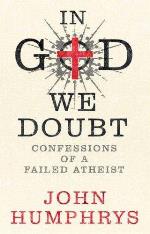In God We Doubt – a review
After several ‘best-selling’ books by well-known atheists attacking religion, John Humphrys has responded with this highly readable and intriguing book of his own, which takes us through his personal responses to the current public arguments.
Questioning Convictions
His interest in the subject has been life-long, but this account of his own wrestling with questions of meaning and morality appears to have been provoked by a number of factors.
His six year old son is not only ‘a world authority on dinosaurs’, but professes to be a Christian (p.301). His father is baffled by this and assures us that this has not come about through parental instruction. Neither does the headmaster of his primary school take responsibility for it. Whilst the influence may have come through a teacher, Humphrys thinks his son may have been talking to his friends. I would be sceptical of that, had I not overheard one of my sons at that age sharing his beliefs quite movingly, while sitting in a wigwam with a friend one hot summer’s afternoon.
Anyway, Humphrys Senior clearly remembers that he himself was asking the big questions about life as a small boy. These were provoked in no small measure by seeing the night sky and wondering where it ever ended. Churchgoing with mother was an important part of his upbringing, but he became ‘bored by the ritualised responses, by priests who seemed to have nothing to say, by my own failure to be genuinely moved by any of it’ (p.28). Yet he says he prayed every night for fifty years.
Life as a journalist has taken him to many parts of the world, where he has witnessed appalling suffering. Surely, he cries, a good God would intervene. He now finds himself in the rather tortured position of doubt, sharing the faith-convictions of neither atheists nor believers. Yet the questions still do not go away.
In the wake of Dawkins’ book, The God Delusion, Humphrys conducted three half-hour radio interviews with prominent religious leaders – Christian, Jewish and Muslim – entitled, Humphrys in Search of God. He was deeply unconvinced by their answers.
The real surprise, however, came with the avalanche of letters that followed. It is generally held that a couple of dozen letters after a broadcast represents considerable interest in the programme, indicating a great many more who would have liked to write but did not get round to it. Humphrys found himself faced with thousands of letters, from atheists, agnostics and believers, arriving by the sackful and showing him how deeply these big questions are impacting the people of Britain today.
It was at this stage that I wrote to him to ask if he would chair a debate organised by the Universities and Colleges Christian Fellowship (UCCF) at Westminster Central Hall between Christian philosopher William Lane Craig and atheistic scientist, Prof. Lewis Wolpert, author of Six Impossible Things Before Breakfast. The subject for the debate was, ‘Is God a Delusion?’ To my delight, he accepted. A national newspaper also seized the opportunity of Craig’s visit to Britain by commissioning Humphrys to write a feature article about him.[1]
On the morning of the debate, I accompanied Craig to Humphrys’ home where he interviewed Craig for two hours over the kitchen table for the newspaper feature. I think all three of us found it a frustrating encounter. The discussion went round in circles and made little progress. To make matters worse, when we left on that damp and windy Tuesday in February, our host said, ‘I don’t know who is going to turn out for this. I don’t imagine many will.’ All that afternoon, I feared he might be right.
When Humphrys arrived at the venue, some thirty or forty people had already gathered. We took him to a room backstage, where sandwiches and coffee were provided. 45 minutes later, I took the platform party onto the stage. My wife, sitting in the second row, watched Humphrys face. He saw the central block of seats was full. He looked to the sides, and saw both side blocks full. He then looked up to the gallery. Every seat was taken. Over 2000, predominantly young people, had attended with some 200 more being turned away at the door. Humphrys rose to the occasion, and his presence turned the debate into an enormously enjoyable exploration of the issues. After the formal exchanges, he sat down with Wolpert and Craig in studio chairs and in his typical manner, pressed them both on the issues they had debated.[2]
Since that debate, Humphrys has waded through further publications from militant atheists, including Christopher Hitchens’ recent book, God is not Great: The Case Against Religion.
So what does he make of it all?
Beliefs of one sort or another take quite a pounding in this book. It is possible, for instance, to describe Christian belief, albeit truthfully, in simply ludicrous terms (see p. 301). This causes me to reflect how easy it is to rubbish anything that is very special. Our brilliant summer holiday in the Outer Hebrides could be described as endlessly living out of suitcases, morning mists ruining the view, driving through bleak countryside, roads blocked by cattle, the lack of cinemas, museums or even decent television reception. Yet the mists, the Highland cattle and the countryside – not to mention the lack of television – were among the many highlights of one of our best-ever holidays. Everything can be mocked and ridiculed, including the pearl of great price. But Humphrys keeps some of his sharpest comments for the militant atheists:
The atheists argue their case with skill, wit and passion. But ultimately they fail – at least for me.... The tone of their diatribes might differ – Wolpert is altogether more polite and moderate than say, Hitchens – but not the content.Actually, Hitchens makes the Taliban look tame. Religion, he says, is, ‘Violent, irrational, intolerant, allied to racism and tribalism and bigotry, invested in ignorance and hostile to free inquiry, contemptuous of women and coercive towards children.’ (pp. 10-11)
‘It probably also gives you dandruff and bad breath too,’ adds Humphrys scornfully. He says that the atheists must do two things:
They must prove, rather than merely assert, that mainstream religion is a malign force in the world. They cannot rely on a small minority of religious extremists to do that for them or hark back to the brutality of earlier centuries. And they must offer an alternative to the millions who rely on their beliefs to make sense of their lives. (p. 16)
Humphrys gives his account of the Wolpert/Craig debate, an interview with Stephen Hawking, the results of a YouGov survey which he commissioned, and some telling extracts from his In Search of God radio series. He then gives us a varied selection of the comments made in the many letters he received. He claims they were especially critical of the Archbishop of Canterbury who ‘seemed so full of doubt that he’d have had trouble persuading a two-year-old to eat his ice cream. They wanted a lot less agonising and a lot more proclaiming his faith’ (p. 135). They also told him that while tragedy turns some against God, most experienced the opposite effect. Their faith has been strengthened by such experience.
A disabled man, coming from an unbelieving family, wrote to him that the four questions asked by Jean-Paul Sartre still stand:
- Why is there something rather than nothing?
- Why is it a cosmos and not a chaos?
- How did life arise from the inanimate?
- Where did man get his mannishness from? (p. 225)
In the latter part of his book, with a little help from C.S. Lewis, Humphrys wrestles with the reality of conscience:
It is difficult to understand the existence of conscience without accepting the existence of something beyond ourselves ... What you cannot do is dismiss it. It exists and is unique to human beings. (p. 243)
A few pages later he notes that, 'Kindness and other virtues make us what we are' (p. 254), and that 'we recognise wickedness when we see it’ (p. 261). He appears to agree with Giles Fraser whom he quotes as saying, 'there is something deeply mistaken about thinking love is reducible to the chemistry of the brain' (p. 311). He also says that, Yes, we should fear fanaticism, but we ‘should also fear a world in which the predominant values are materialism and consumerism, and the greatest aspiration of too many children is to become a celebrity’ (p. 319). This dispute, he says, ‘goes to the core of what it is to be human’ (p. 287).
This brings him to describe Craig’s use of the moral argument as evidence for the existence of God. He sets out the argument clearly enough (essentially it claims that objective moral values are only possible if God exists), but then rejects it out of hand. ‘I’m afraid it’s rubbish,’ he writes (p. 245). However, his reasons for dismissing it reveal that he has not properly grasped it. As the DVD reveals, he did not understand it during the Westminster debate, and he still hasn’t felt the force of it now. He writes, ‘Offhand I can’t think of a single country – whatever its religion or lack of it – whose laws condone murder, theft or rape’ (p. 245). But Craig’s point is that, while moral codes can be developed and followed, atheists have no grounds for such behaviours to be considered objectively evil in absolute terms. On their thinking, evil is merely a human and social construct. Such laws are just ‘club rules’ created for the benefit of members, not the eternal values of ultimate reality. However, if objective evil exists, God must also exist (p. 76).
‘Atheism is easy,’ proclaims Humphrys (p. 4). And it is easy being a fundamentalist. Doubt, however, is altogether different. ‘The default position for the human condition is that there is something out there. This can’t all be one big accident. Otherwise, what is the point?’ (p. 5). William Craig admitted that he had doubts, but nonetheless believed in God. ‘He patiently pointed out to me that faith meant exactly what it says. If it could be proved, it would not be faith’ (p. 8).
Unfortunately, nowhere do we get a good description from Humphrys of faith as ‘trust’ in someone whose credentials make him worthy of being trusted. The reasonableness of faith and the grounds that would need to be established for trust to be an appropriate, even necessary, response are not adequately examined.
Humphrys’ honesty, however, is very attractive. ‘I suspect I have spent most of my spiritual journey looking for reasons to satisfy myself that God does not exist. To buttress my scepticism’ (p. 9). This is a personal story of a struggle with life’s biggest questions, from a man with a very wide exposure to national and international affairs, who is, in turn, someone we all feel we know. He may irritate us or make us laugh, but his extrovert humanity is writ large. Like a noisy and awkward relative, he can be heard in our homes on an almost daily basis. We know him, and that is one of the reasons his personal quest for answers is so engaging.
 Book title: In God We Doubt
Book title: In God We Doubt
Author: John Humphrys
Keywords: God, belief, doubt, atheism, religion, morality
Publisher: Hodder & Stoughton
Publication Date: 6 September 2007
Buy In God We Doubt
from Amazon.co.uk
or from Amazon.com
References
[1] John Humphrys, 'The Return of God', Daily Telegraph, 3 March 2007.
[2] The event was filmed and DVDs can be ordered through UCCF’s bethinking.org website at £9.99 inc. post & packing.
© 2007 Peter May



